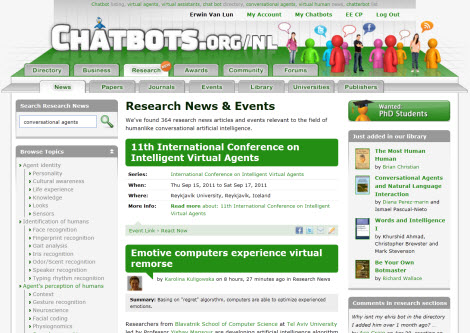
NEWS: Chatbots.org survey on 3000 US and UK consumers shows it is time for chatbot integration in customer service!read more..
Chatbots.org Business News
Chatbots.org 2.7: The Academic Research Section is there!
 | by Erwin van Lun on 14 years, 2 months ago in Chatbots.org news, Chatbots.org News |
Summary: 1,031 academic journals, 13,000+ universities, 163 books, 327 annual academic events, 475 publishers & paperssss
 Chatbots.org launches the largest specialized research area on humanlike conversational artificial intelligence in its new 2.7 release on http://www.chatbots.org/research.
Chatbots.org launches the largest specialized research area on humanlike conversational artificial intelligence in its new 2.7 release on http://www.chatbots.org/research.
We have worked on it for over 18 months, and we are very excited to present the result today: 1,031 academic journals, more than 13,000 universities, 163 books, 327 annual academic events, 475 publishers and loads of academic papers. And the best is: from a content point of view, this is just the start! This area is expected to grow very fast.
We believe that the academic community will benefit greatly from this area. They will get in touch with businesses to set up commercially funded projects, attract talent by profiling themselves in our new university ranking and align themselves with innovative entrepreneurs.
This article will demonstrate what to expect from our new research section; how it all fits into the Chatbots.org scope and where it is heading to.
Read more about: Chatbots.org 2.7: The Academic Research Section is there!
Emotive computers experience virtual remorse
 | by Karolina Kuligowska on 14 years, 2 months ago in Agent's Processing, Emotion, Learning, Research News |
Summary: Basing on "regret" algorythm, computers are able to optimize experienced emotions.
 Researchers from Blavatnik School of Computer Science at Tel Aviv University led by Professor Yishay Mansour are developing artificial intelligence algorithm in order to equip machines with human emotions. According to this algorithm based on machine learning, the computer programs are taught a sense of “regret” and how to “feel sorry” for their mistakes.
Researchers from Blavatnik School of Computer Science at Tel Aviv University led by Professor Yishay Mansour are developing artificial intelligence algorithm in order to equip machines with human emotions. According to this algorithm based on machine learning, the computer programs are taught a sense of “regret” and how to “feel sorry” for their mistakes.
Read more about: Emotive computers experience virtual remorse
Chatbots stimulate a positive ‘flow’ among their users
 | by Frans Plat on 14 years, 2 months ago in Human's perception of Agent, Emotion, Business News |
Summary: Research shows that chatbots stimulate a more positive state of mind and a more personal online experience.
 Research shows that chatbots stimulate a positive state of mind among their users. As a result users enjoy more pleasure in performing their activities and spend more time on performing them. According to ‘social response theory’, the ‘social cues’ send by chatbots increase the users’ involvement in interacting with a computer. As a consequence chatbots contribute to a more personal perception of the online experience.
Research shows that chatbots stimulate a positive state of mind among their users. As a result users enjoy more pleasure in performing their activities and spend more time on performing them. According to ‘social response theory’, the ‘social cues’ send by chatbots increase the users’ involvement in interacting with a computer. As a consequence chatbots contribute to a more personal perception of the online experience.
Read more about: Chatbots stimulate a positive ‘flow’ among their users
Results Chatterbox Challenge 2011
 | by Wendell Cowart on 14 years, 3 months ago in Chatterbox challenge, Award News |
Summary: The winner of the 2011 Chatterbox Challenge is Bildgesmyte by Patti Roberts
The scores are all in and the decision of the winner is an unanimous one. The winner of the 2011 Chatterbox Challenge is:
Bildgesmythe by Patti Roberts
Second Place goes to Mitsuku by Stephen Worswick.
Third Place goes to Skynet AI by Ken Hurtubise
